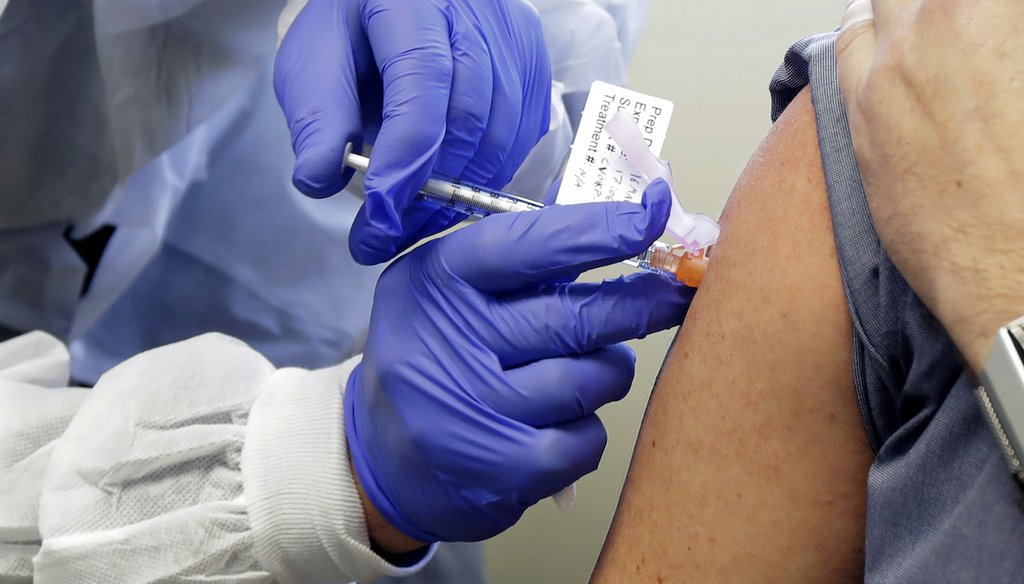Stand up for the facts!
Our only agenda is to publish the truth so you can be an informed participant in democracy.
We need your help.
I would like to contribute

A patient receives a shot in the first-stage safety study clinical trial of a potential vaccine for COVID-19 at the Kaiser Permanente Washington Health Research Institute in Seattle. (AP)
"The Week in Fact-checking" compiles short summaries of our best work; the links will take you to our full reports. Want this report early and via email? Sign up here.
This week: All about a coronavirus vaccine … Bye bye, Bernie ... Were there U.S. inspectors in China? … Trump gets impeachment history wrong … What about using a CPAP for coronavirus? … Social distancing is not a government plot … Medical experts weigh in on chloroquine
As Americans retreat under orders to stay at home, it’s hard to think too far in the future. But there’s one group who are firmly focused on what is to come: Vaccine researchers.
Here, we’ve summarized a discussion of coronavirus vaccine research with two researchers from the University of Maryland School of Medicine: Kathleen Neuzil, director of the Center for Vaccine Development and Global Health, and Wilbur Chen, an adult infectious disease expert with the same center. The discussion was sponsored by the National Press Foundation on April 3.
How long does it typically take to develop a vaccine?
It’s not unusual for vaccine development timelines to take 10 to 15 years, Chen said. Generally, a vaccine trial has several phases. In an initial phase, lasting about six months, the vaccine is given to healthy volunteers to make sure the vaccine is safe for general use and to note whether bad reactions occur.
In the second phase, lasting six to 12 months, the researchers try to determine whether the shot produces an immune-system response.
The third phase can last from one to three years and involves thousands of patients, and it may require several rounds that focus on specific subgroups. It focuses on efficacy and also collects data on more unusual negative interactions.
Is the current quest for a vaccine operating on a faster timetable?
Yes. The first U.S. clinical trials for a coronavirus vaccine began in March, meaning they were up and running just a couple of months after the virus was detected — an unusually quick start. There is also a separate vaccine being tested in China.
"When we have a pandemic, we try to truncate everything," Chen said. That was done in the case of Ebola virus outbreaks in recent years.
For coronavirus, creating a new vaccine could end up taking 12 to 18 months, or possibly shorter, Neuzil said. That would be "a tremendous feat," she said.
Neuzil said she expects more vaccines to begin clinical trials in the coming months. It’s beneficial to simultaneously test a range of experimental vaccines to maximize the chance that at least one will work.
In normal times, what percentage of vaccines end up becoming successful?
Only about 5% to 10%, Neuzil said. When a vaccine fails, it’s usually not because of safety concerns, she said. More likely, it didn’t produce enough of an immune response to be useful in combating the germs it’s targeting.
How hard is it to manufacture enough doses once a vaccine is approved?
Vaccines based on a familiar design will be easier to produce, Neuzil said, and the vaccines being tested now are based on older designs. Another factor that could speed up the process is if manufacturers, possibly with government backing, begin to build out their production capacity before the vaccine is approved. Also, because of the urgency of the pandemic, different companies in different countries may collaborate on production. The good news is that demand will be high, making it easier for vaccine manufacturers to make decisions.
How much do we know about whether people will have permanent immunity after getting a vaccination, or whether booster shots will be needed?
We don’t know yet. Scientists do have some hints from previous coronaviruses that circulated in recent years. For some of those, immunity only lasts six to 12 months. If that’s the case with COVID-19, vaccinations may be an annual rite, or more frequently, just as influenza shots are.
— Louis Jacobson
Vermont Sen. Bernie Sanders suspended his second bid for the presidency this week, saying he saw no path to victory over former Joe Biden in the Democratic presidential primary.
We at PolitiFact have been vetting his claims for nearly 11 years. Overall, his track record on the Truth-o-Meter shows that more often than not, his statements have the ring of accuracy. We’ve checked him 171 times, and while that includes 18 False ratings, there is not one Pants on Fire, and his most common rating is Mostly True.
Sanders was one of the most fact-checked candidates of the crowded primary field. Most of his claims were about his defining issue, Medicare for All. Read our overview of fact-checks of Sanders from the 2020 campaign.
Biden wrong on inspectors in China. On CNN, Joe Biden said he recommended sending U.S. inspectors to China in the early days of the coronavirus, but Trump didn’t listen. "There was no effort to do that. He didn't put any pressure on (Chinese President) Xi. I guess because of his trade deal, which wasn't much of a deal. And in addition to that, what happened was, we had one person in-country who was working. He pulled him out of the country."
There’s a lot wrong here; we rated Biden’s statement Mostly False. Trump’s Health and Human Services secretary did make the effort to get U.S. experts inside China. But China resisted outsiders, both from the U.S. and the World Health Organization. Biden’s assertion that Trump pulled someone out of China isn’t accurate, either. An American CDC epidemiologist left in July and was not replaced. The overall American staff went from eight down to three. Biden made it sound as though everyone left, but some CDC staff remained.
Trump wrong on travel and testing. Trump said, "Now, they’re doing tests on airlines — very strong tests — for getting on, getting off. They’re doing tests on trains — getting on, getting off." Trump's statement about tests at transportation hubs rates Pants on Fire.
Passengers on planes and trains are not being tested for COVID-19. It’s possible that Trump was referring to screenings, which could include a temperature check or a questionnaire. But even screenings are not as widespread as he said; they are happening at 13 airports for certain countries.
Trump on the inspector general. Trump removed the intelligence community inspector general because Trump said he passed along a "terrible, inaccurate whistleblower report." We rated this claim Pants on Fire. (And named it the 2019 Lie of the Year.) In reality, the whistleblower complaint got nearly every detail correct, as the memorandum released by the White House and the impeachment inquiry showed. It was correct on the request that Ukraine investigate the Bidens and the notion that Ukraine might have the DNC server that was hacked by the Russians in the 2016 election.
Trump has touted chloroquine or hydroxychloroquine as a coronavirus cure in more than a half-dozen public events since March 19. Medical experts are more cautious, citing lack of definitive medical evidence, significant side effects, and the impacts on patients with lupus and other diseases who already use the drug.
Not long after Trump began touting chloroquine, an Arizona man died and his wife was hospitalized after they ingested a fish-tank solvent that includes chloroquine phosphate. A few days later, the CDC released a warning, not just against using the fish-tank cleaner but also the drug chloroquine and its variants without a doctor’s orders.
In a statement to PolitiFact, the American Medical Association seconded such concerns, saying it "strongly opposes" prescribing chloroquine as a preventive measure and also opposes pharmacies and hospitals "purchasing excessive amounts" of the medication.
"Even if prescribed by a physician, I am not convinced that patients are being adequately screened or monitored for some of the more serious side effects, like cardiotoxicity," Joel F. Farley, associate head of the department of pharmaceutical care and health systems at the University of Minnesota College of Pharmacy.
In the meantime, focusing on one potential treatment could overshadow the nitty-gritty things Americans need to do on a daily basis to stay safe.
"My biggest concern is that people will believe there’s some magic cure and not follow social distancing and other normal precautions in the belief that there’s a drug to ‘fix this,’" said Ally Dering-Anderson, a clinical associate professor at the University of Nebraska College of Pharmacy.
Read more in this story.
— Louis Jacobson
-
The International Fact-Checking Network at the Poynter Institute has united more than 100 fact-checkers around the world (including us) in publishing, sharing and translating facts about the novel coronavirus. The #CoronaVirusFacts / #DatosCoronaVirus Alliance is contributing fact-checking to a database that gathers all the falsehoods that have been detected by the alliance worldwide. Read more about the alliance here and search its database here.
-
In the face of a fall-off in advertising due to the coronavirus and physical distancing, journalism organizations are struggling. Poynter has been tracking layoffs, furloughs, and closures caused by the coronavirus in the United States. Check out their ongoing list and send them tips.
-
Poynter has compiled resources about COVID-19 that include newsletter sign-ups, fact-checking tools and tips for journalists. See the offerings at poynter.org/covid-19-poynter-resources/
As hospitals worry about their dwindling reserves of ventilators, interest has turned to another device that aids in breathing: continuous positive airway pressure machines, or CPAPs.
CPAPs are widely used to treat sleep apnea, a condition that forces the patient to wake up repeatedly and leaves them excessively tired.
A CPAP addresses sleep apnea by producing a consistent, calibrated flow of air through the airways, routed through tubes and a mask attached to the face.
CPAP machines have some superficial similarities with ventilators, raising the question of whether they could be adapted to ease the coronavirus-driven ventilator shortage.
Experts told us that to be used on coronavirus patients, CPAPs would have to be retrofitted with filtering systems so they don’t discharge large amounts of virus into the surrounding air. The necessary filters aren’t expensive, but the fixes should only be done by a respiratory therapist or doctor.
Medical professionals say people who use a CPAP regularly need to consult with a doctor if they contract coronavirus, because the risks of continuing to use the device may outweigh the benefits. For people with shortness of breath from coronavirus, it’s recommended that they check into a hospital.
Do you smell smoke?
Here's your Pants on Fire fact-check of the week:
The government is closing businesses to stop the spread of coronavirus even though "the numbers are nothing compared to H1N1 or Ebola. Everyone needs to realize our government is up to something ..."
See what else we've rated Pants on Fire this week.
Knowing the facts has never been more important. Please consider donating to PolitiFact today.
Our Sources
See links for sources.























































